In a city as busy and booming as New York, the demand for home renovations is sky-high. Whether it’s a brownstone restoration in Brooklyn or a bathroom upgrade in Queens, NYC homeowners regularly seek contractors to bring their visions to life. Unfortunately, this high demand also attracts unlicensed and dishonest contractors ready to take advantage of unsuspecting homeowners.
Before signing any contract or handing over a deposit, it’s crucial to be aware of common scams and red flags. Here’s how you can protect yourself from renovation fraud in NYC.
Why NYC Homeowners Need to Stay Vigilant
New York City is no stranger to contractor scams. From fake licensing and inflated costs to disappearing contractors, these frauds can result in thousands of dollars in losses, not to mention unfinished or poorly done work.
Due to NYC’s complex building codes and high costs, homeowners are particularly vulnerable. Knowing the warning signs and following smart practices can make all the difference between a successful renovation and a financial nightmare.
1. Always Check for Proper Licensing and Insurance
Every home improvement contractor in NYC must be licensed by the Department of Consumer and Worker Protection (DCWP). Before hiring, verify the license number online through the NYC DCWP license lookup tool.
Also ask for proof of general liability insurance and workers’ compensation. This ensures you’re protected in case of on-site injuries or property damage.
2. Avoid Contractors Who Demand Large Upfront Payments
Scammers often ask for a large deposit, sometimes the full project cost, before starting any work. This is a major red flag.
In NYC, a standard practice is to pay no more than 10-30% upfront, with additional payments scheduled based on project milestones. Never pay in full before work begins.
3. Get Everything in Writing
Always insist on a detailed written contract that outlines: Scope of work, materials to be used, total cost and payment schedule, start and end dates and permits and responsibilities. Avoid verbal agreements. A professional contractor will have no problem putting everything in writing.
4. Watch Out for “Too-Good-to-Be-True” Offers
If a contractor’s estimate is significantly lower than others, it might be a trap. Some scammers bait homeowners with cheap quotes, then increase prices once work begins, citing “unexpected problems” or material costs.
Get at least three estimates from reputable companies to compare fair market pricing.
5. Research Reviews and References
Look up online reviews on Google, Yelp, and Better Business Bureau. Also, ask for references from past clients and take the time to contact them.
If a contractor avoids giving references or has consistent negative feedback, consider it a red flag.
6. Never Pay in Cash or Under the Table
Scam artists often ask for cash payments to avoid leaving a paper trail. Insist on checks, credit card payments, or documented digital transactions like bank transfers.
This ensures you have proof of payment if a dispute arises and protects you legally.
7. Confirm That Required Permits Are Pulled
NYC has strict rules about permits for certain home improvements. If a contractor tells you permits aren’t needed, especially for major work, double-check with your local building department.
A dishonest contractor may skip permits to cut corners, leaving you liable for violations or stop-work orders.
8. Be Wary of Door-to-Door Solicitations
If someone shows up at your door claiming they “just finished a job nearby” and offers a steep discount to start yours immediately, be cautious. Many scam contractors use this tactic to pressure homeowners into impulsive deals.
Legitimate contractors don’t go door-to-door looking for work in NYC.
9. Check Business Location and Stability
Scammers often use fake addresses or operate from P.O. boxes. Verify that the contractor has a real business location, a working phone number, and a long-standing presence in the community.
A quick Google Maps search or Better Business Bureau check can confirm if their address is real and active.
10. Don’t Be Rushed Into a Contract
If a contractor pushes you to sign quickly or threatens to withdraw a “limited-time offer,” take a step back. This pressure tactic is used to prevent homeowners from doing due diligence.
A trustworthy contractor will give you time to review the contract, seek legal advice, or compare quotes.
Conclusion
Renovating a home in NYC is a major investment, and with it comes the responsibility of protecting that investment from scams and shady contractors. By following these practical tips, from verifying licenses to demanding written agreements and avoiding cash-only deals, you’ll stay in control of your renovation project.
Smart homeowners know that being cautious upfront can save money, stress, and legal headaches in the long run. When in doubt, consult local consumer protection agencies or professional associations before proceeding.
